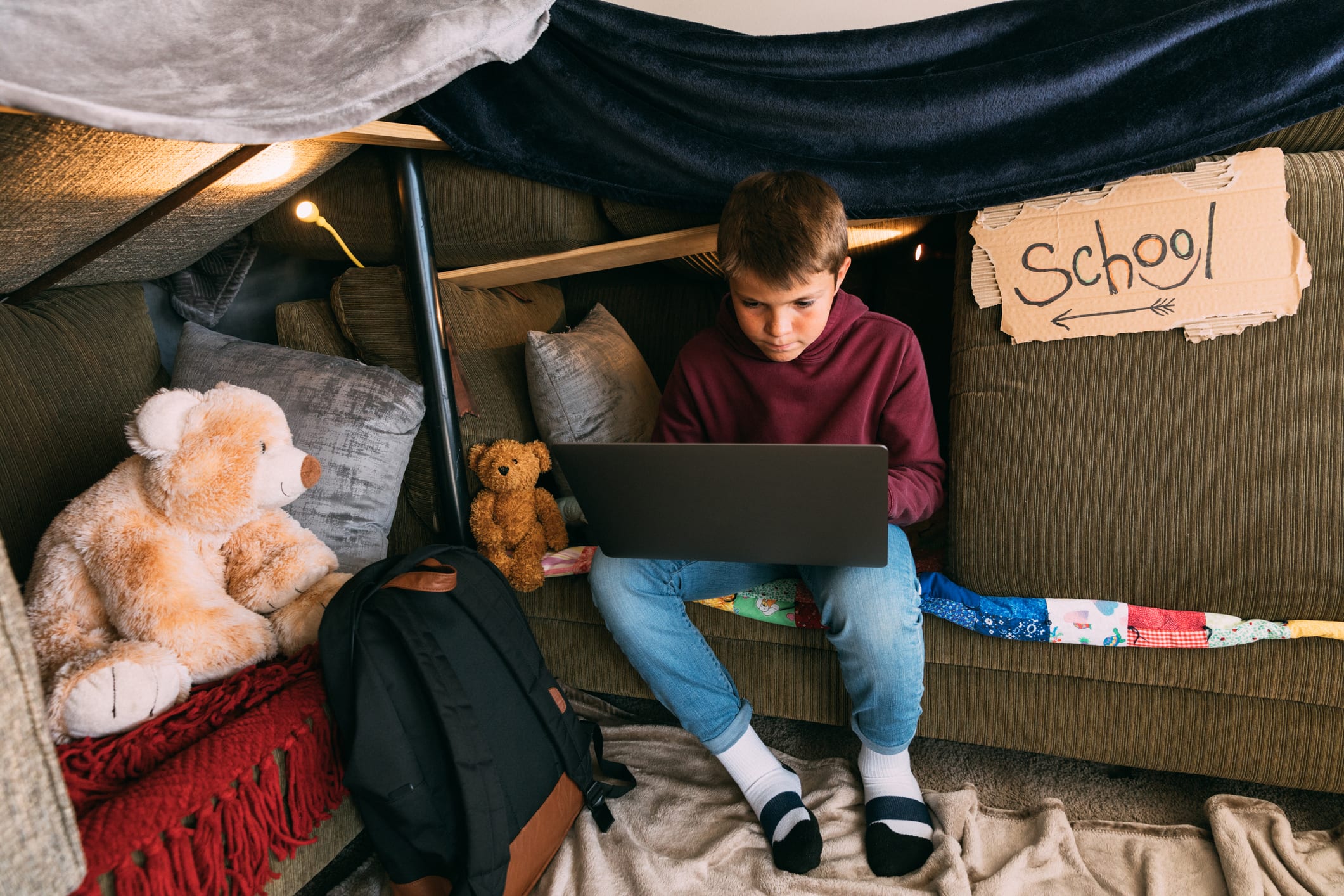Whether your kids are clicking in through an app, attending a learning pod or a hybrid of different options, there’s no sugar-coating that this upcoming school year will be a challenging experience for teachers, parents and students alike. If these past few months have taught us anything, it’s that a little bit of help really goes a long way. That’s why our team at Sunday Riley partnered with DonorsChoose to donate more than $11,000. This helped fund 17 different classrooms with supplies our teachers needed — from PPE to books and everything in between — just in time to ring in the start of the new school year. And for the parents who have suddenly found themselves in another round of homeschooling, a little help is coming your way, too. We asked teachers to give their best advice on how to make the distance learning situation easier. Read on for their tips and remember: You’ve got this!
Prep the ideal study space
Studying where they sleep sounds comfortable and convenient, but using their bed or even bedroom as their study space can limit focus and decrease productivity, according to the American College of Healthcare Sciences. Not only does it become too easy to lure themselves into a midday snooze session if they study on their bed, but they don’t have the proper space to organize their necessary school materials. “Find a spot in your home where you will call ‘school.’ You don’t need to redecorate your entire home to make this happen, but someplace in the house that’s well-lit with a comfortable chair and desk is ideal,” says Carol Mahida, an English teacher at The Pingry School. Avoid setting up their space in high-traffic areas like the kitchen. If space is tight, consider a mini portable desk or rolling desk in case they need to switch rooms.
Prep the night before
Hunting down an iPad 30 seconds before the Zoom class is supposed to start can be super stressful for everyone. Instead, help prep everything your kid might need the night before. “Make sure they have all their supplies set up so they’re not scrambling during the day. Set alarms on your phone or use Alexa to remind your kids to sign on to their meetings for the following day. It’s easy to lose track throughout the day [especially in a home setting],” says Kelly Moroso, a school psychologist at Westerly Public Schools. One of the most important parts of prepping at night? “Don’t forget to charge all your devices!” adds Moroso. They won’t want their computer to die right before an important announcement.

Create a consistent routine
Children thrive on having a routine as it gives them a sense of security. “Maintain a daily schedule regardless of whether your child is going into school or remote learning will help set your child up for success. Have your child wake up at the same time every school day and get ready even if they aren’t leaving the house,” says Dr. Francyne Zeltser, a school psychologist at Valley Stream District 30 in NYC. “Have a beginning and end of the ‘school day’ so that your child knows what to expect throughout the day, similar to what they have experienced in prior school years.”
Reach out to the teacher
Don’t forget that teachers are in this with you during these unprecedented times. Building a relationship with your child’s teacher is more important than ever. “Call their teacher and let them know how your child and family are doing. If your child needs extra help, your child’s educator will do everything they can to ensure your kid is not only learning but is happy and stable,” says Nicholas Ferroni, an award-winning high school teacher in New Jersey. Communication is key. Consider building in weekly check-ins to discuss your kid’s progress and goals, as well as any questions that you may have.

Let the parent become the student
In a new world where parents are doubling as first-time tutors, try a “game” of role reversal to alleviate some of the pressure. “That’s right—let your child teach you what they need to learn. Not only will your child have fun ‘playing teacher,’ but it will take the stress off of you and guarantee that your child learns and understands the material. We only truly understand things when we are able to teach it to others. If your child is older, have them give you recaps on what they are doing in each class: ask questions and let them discuss it with you,” says Ferroni.
Get them to discover a new hobby
You may find with virtual learning that they might have some extra time on their hands, especially without their regular extracurricular activities keeping them occupied for the afternoon. “I encourage my students to spend time doing more of what they love, picking up a new hobby or volunteering with a local organization,” says Mahida. Even better if their new passion project also gets them active, like picking up their local park’s trash to help the environment.

Find time to get your kids moving
The pandemic has made it so challenging to encourage kids to get away from their screens. Now with the increased amount of screen time thanks to virtual learning, “they have to be more committed to making sure they find time during the day to move,” says Mahida. “Getting away from the desk will clear their head and improve their mood,” she says. According to the World Health Organization, children ages 5 to 17 years should do at least an hour of moderate to vigorous physical exercise three times a week. It doesn’t have to be done consecutively. Try two thirty-minute breaks a day (once in the morning and again in the afternoon).
Prioritize their mental health
We are all trying to navigate a new normal, but frankly, there’s nothing normal about it. It’s more important than ever to check in on their emotional status, not just their academic one. “Be ready to support them with intentional conversations about what is going on in our world right now. Young people are very perceptive and they will form opinions about the world whether or not we discuss it with them,” says Eliza Bryant, a special education teacher at Talcott Fine Arts and Museum Academy. “Parents can support their children in learning to think critically about the world around them by asking open-ended questions to help them form their own opinions. I know that thinking about current events can be stressful for adults, so this doesn’t have to be a daily ritual, but it should have consistency.”

Let them take breaks
It’s easy to feel like your kids are falling behind this year, but taking breaks instead of pushing through a frustrating assignment can increase productivity and creativity. “If your WiFi happens to be acting up or your kid needs a breather, let them simply play. Play is crucial in development, especially for the youngest learners. It encourages their imagination, allows for opportunities to build upon communication skills and helps children learn how to problem-solve,” says Amy Zabludovsky, a first-grade teacher at Bloomingdale Avenue School.
Celebrate accomplishments — even the small ones
Particularly during these trying times, remember that positive reinforcement will go a long way. Take victory in the little wins: “If you were able to get your child to attend their virtual class 20 minutes longer than the week before, that’s worth acknowledging! Give you and your child a pat on the back. No one is expecting perfection in a situation like this,” says Brittany Smith, a Pre-K 4 teacher in the Atlantic City School District.
Be honest if it’s not working
Your kid’s school wants their students to succeed, so there’s no need to silently struggle if your school’s plan isn’t working for your family. “Work together with your school to make distance learning work for your family’s schedule. If it’s not working how they lay it out, be honest with them and try to find out what the priorities are or whether you can work off schedule if needed,” says Moroso. “We all get it and there is nothing wrong with advocating for what your family needs to function, just try to help brainstorm some options because we don’t always know what works in your house.” Those tweaks might look like weekly one-on-one conferences, extra help after group lessons are over or modified homework assignments.







